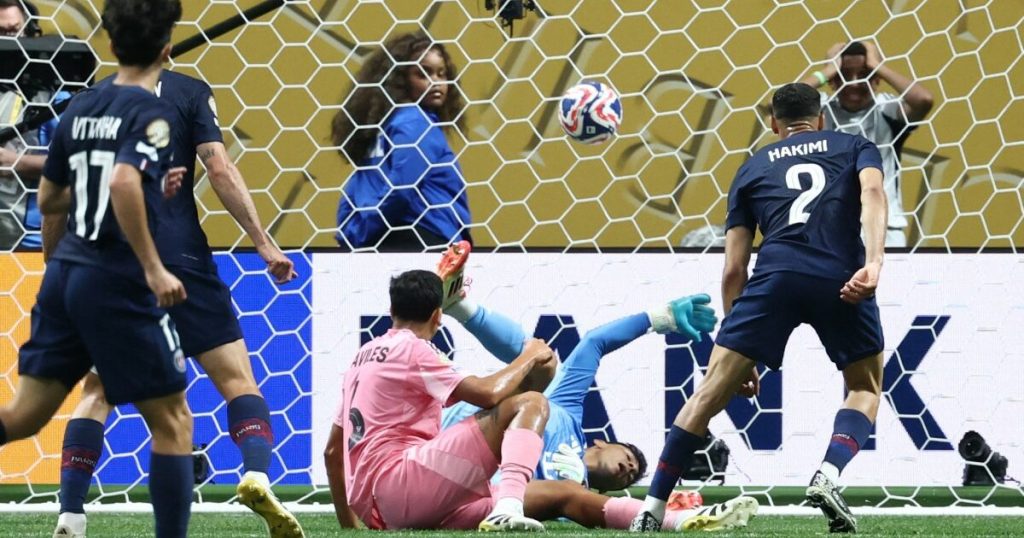Paris Saint-Germain (PSG) emphatically defeated Inter Miami 4-0 in the FIFA Club World Cup Round of 16, showcasing the stark difference in quality between the European giants and the MLS side. Despite the presence of Lionel Messi, Sergio Busquets, Luis Suarez, and Jordi Alba, all former Barcelona stalwarts, Inter Miami were unable to match the intensity and precision of PSG. The French champions dominated the game from the outset, controlling possession and creating numerous scoring opportunities. While Messi’s presence drew a large, enthusiastic crowd, his individual brilliance couldn’t overcome the collective strength of PSG. The game served as a stark reminder of the gap between European elite football and the developing MLS.
The match, held at the Mercedes-Benz Stadium in Atlanta, quickly swung in PSG’s favor. Young Portuguese midfielder Joao Neves opened the scoring early, capitalizing on a Vitinha free-kick to head the ball past Miami goalkeeper Oscar Ustari. PSG’s relentless high press and midfield control stifled Miami’s attempts to build attacks, limiting Messi’s involvement in the game. While the Argentine star produced flashes of his trademark skill, they were too infrequent to disrupt PSG’s dominance. Inter Miami’s struggles were compounded by defensive errors, giving PSG further opportunities to extend their lead.
PSG’s second goal arrived midway through the first half, again featuring Neves. A misplaced pass by Sergio Busquets in front of his own box allowed PSG to quickly regain possession. A swift combination play between Fabian Ruiz and Bradley Barcola set up Neves for a simple tap-in, doubling PSG’s advantage. The floodgates then opened, with Tomas Aviles deflecting a Desire Doue cross into his own net for an unfortunate own goal. Achraf Hakimi added a fourth just before half-time, capitalizing on a rebound after his initial shot hit the crossbar. The first half ended with PSG firmly in control, leaving Inter Miami with a seemingly insurmountable deficit.
The second half, despite the lopsided scoreline, saw a more resilient Inter Miami. Messi, determined to make a mark, began to exert more influence on the game. He crafted a brilliant pass for Luis Suarez early in the half, but the Uruguayan striker couldn’t convert the chance. While a comeback of Barcelona’s 2017 proportions against PSG, also managed by Luis Enrique, was highly improbable, Messi continued to push forward, testing PSG goalkeeper Gianluigi Donnarumma with a low drive. Luis Enrique introduced Ousmane Dembele, returning from injury, but the French winger struggled to find his rhythm. Messi had a late free-kick opportunity but his effort struck the wall, symbolizing Miami’s ultimately futile attempts to breach PSG’s defense.
Although defeated, Inter Miami showed improved composure in the second half, managing to create a few chances and disrupt PSG’s rhythm. While the loss was undoubtedly disappointing, the MLS side held their own better than some had predicted, avoiding a complete rout similar to PSG’s 5-0 Champions League final victory against Inter Milan. Jordi Alba acknowledged the difficulty of facing arguably the world’s best team, but also highlighted Inter Miami’s respectable performance, particularly in the second half, where they exerted more control and created more problems for PSG. While their Club World Cup journey ended, the experience provided a valuable benchmark against top-tier competition.
PSG, with their convincing victory, advanced to the quarter-finals to face either Bayern Munich or Flamengo. Their dominant performance against Inter Miami underscored their status as tournament favorites and sent a clear message to their upcoming opponents. The comprehensive win, achieved through a combination of youthful energy, tactical discipline, and individual brilliance, affirmed PSG’s title aspirations and further emphasized the burgeoning talent within their ranks. The tournament provides a platform for PSG to showcase their strength on a global stage and further solidify their position among football’s elite.


